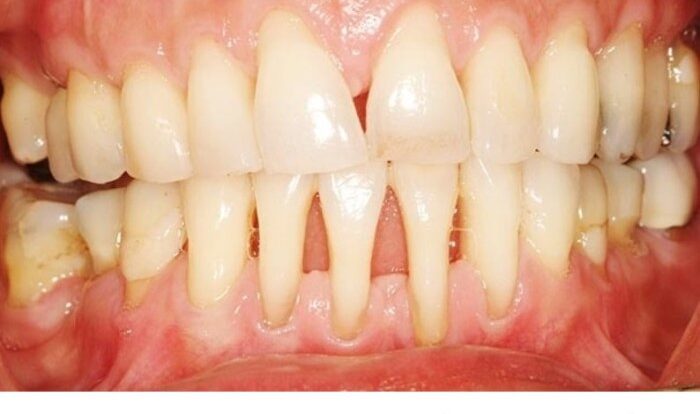
How to cure gum disease without a dentist – Gum disease, also known as periodontal disease, is a common problem that can affect people of all ages. While it’s usually treated by a dentist, there are some things you can do at home to help prevent and cure gum disease without a dentist.
In this guide, we’ll discuss the natural remedies, home care techniques, nutritional considerations, lifestyle modifications, and alternative therapies that can help you improve your gum health and prevent gum disease.
Natural Remedies for Gum Disease

Gum disease, also known as periodontal disease, is a common oral health problem that can lead to serious complications if left untreated. While traditional dental treatments are effective in treating gum disease, there are also several natural remedies that can help improve symptoms and prevent further progression.
It’s important to note that these natural remedies should not replace regular dental checkups and professional treatments. If you have gum disease, it’s crucial to consult with a dentist to determine the best course of treatment.
Herbs
Several herbs have antibacterial and anti-inflammatory properties that can benefit gum health.
- Aloe vera:The gel extracted from aloe vera leaves contains anti-inflammatory compounds that can soothe irritated gums and reduce swelling.
- Green tea:Green tea extract contains polyphenols, which have antioxidant and antibacterial properties. It can help reduce inflammation and kill bacteria that contribute to gum disease.
- Echinacea:This herb has immune-boosting properties and can help strengthen the body’s defenses against gum disease-causing bacteria.
Essential Oils
Certain essential oils possess antimicrobial and anti-inflammatory properties that can aid in treating gum disease.
- Tea tree oil:Tea tree oil is a potent antibacterial and antifungal agent. It can help kill bacteria that cause gum disease and reduce inflammation.
- Peppermint oil:Peppermint oil has analgesic and antibacterial properties. It can help relieve pain and discomfort associated with gum disease.
- Clove oil:Clove oil has strong antibacterial and anti-inflammatory properties. It can help reduce pain and swelling in the gums.
Dietary Supplements
Some dietary supplements can support gum health by providing essential nutrients or enhancing the immune system.
- Vitamin C:Vitamin C is an antioxidant that helps strengthen the immune system and protect against gum disease.
- Coenzyme Q10:Coenzyme Q10 is an antioxidant that helps protect cells from damage. It may help reduce inflammation and improve gum health.
- Omega-3 fatty acids:Omega-3 fatty acids have anti-inflammatory properties that can help reduce gum inflammation and pain.
Home Care Techniques for Gum Disease
Maintaining a healthy oral hygiene routine is essential for preventing and managing gum disease. Effective home care techniques include proper brushing and flossing techniques, along with other practices that reduce plaque and bacteria buildup.
Gum disease can be a real pain, but did you know that you can actually cure it without ever having to see a dentist? That’s right, there are a few simple things you can do at home to get rid of gum disease for good.
Brushing Techniques
- Use a soft-bristled toothbrush and gentle pressure to avoid damaging gums.
- Brush for at least two minutes, twice a day, focusing on the gum line and hard-to-reach areas.
- Use a fluoride toothpaste to strengthen tooth enamel and prevent cavities.
Flossing Techniques
- Use dental floss to remove plaque and bacteria from between teeth, where a toothbrush cannot reach.
- Floss gently, avoiding snapping or sawing motions that can injure gums.
- Floss at least once a day, preferably before bedtime.
Other Home Care Tips
- Use an antiseptic mouthwash to kill bacteria and reduce plaque.
- Avoid sugary foods and drinks, which can feed bacteria and contribute to plaque formation.
- Get regular dental checkups and cleanings to remove tartar and monitor gum health.
Nutritional Considerations for Gum Disease

Gum disease is a common problem that can be caused by a variety of factors, including poor oral hygiene, smoking, and certain medical conditions. However, nutrition also plays an important role in gum health. Eating a healthy diet that is rich in essential nutrients can help to prevent and treat gum disease.
Vitamins and Minerals
Several vitamins and minerals are essential for gum health. These include:
- Vitamin C: Vitamin C is an antioxidant that helps to protect the gums from damage. It is found in citrus fruits, berries, and leafy green vegetables.
- Vitamin D: Vitamin D is important for bone health, but it also plays a role in gum health. It is found in fatty fish, eggs, and fortified milk.
- Calcium: Calcium is essential for strong teeth and bones, but it also helps to keep the gums healthy. It is found in dairy products, leafy green vegetables, and fortified foods.
- Iron: Iron is important for red blood cell production, which is essential for carrying oxygen to the gums. It is found in red meat, fish, and beans.
Antioxidants, How to cure gum disease without a dentist
Antioxidants are substances that help to protect the body from damage caused by free radicals. Free radicals are unstable molecules that can damage cells and DNA. They are found in a variety of foods, including fruits, vegetables, and whole grains.
Dietary Recommendations
To promote optimal gum health, it is important to eat a healthy diet that is rich in essential nutrients. This includes:
- Eating plenty of fruits and vegetables
- Choosing lean protein sources
- Limiting processed foods and sugary drinks
- Drinking plenty of water
Lifestyle Modifications for Gum Disease
Lifestyle choices play a significant role in maintaining gum health. Understanding the impact of certain habits on gum disease can help you make positive changes to support your oral hygiene.
Smoking
Smoking is one of the leading risk factors for gum disease. Nicotine constricts blood vessels, reducing blood flow to the gums. This impairs the delivery of nutrients and oxygen to the gums, making them more vulnerable to infection and inflammation.
Stress
Chronic stress can weaken the immune system, making you more susceptible to gum disease. Stress hormones like cortisol can suppress the body’s natural defenses, allowing bacteria to thrive in the mouth.
Sleep Deprivation
Getting enough sleep is crucial for overall health, including gum health. Sleep deprivation can lead to a weakened immune system, making it harder for the body to fight off gum infections.
If you’re suffering from gum disease, you may be wondering if there are any ways to cure it without seeing a dentist. While it’s always best to consult with a professional for the most effective treatment, there are some home remedies that may help to alleviate symptoms.
Click here to learn more about how to cure gum disease without a dentist.
Alternative Therapies for Gum Disease: How To Cure Gum Disease Without A Dentist

Alongside conventional dental treatments, various alternative therapies may provide additional support in managing gum disease. These therapies aim to alleviate inflammation, promote healing, and enhance overall oral health.
However, it’s crucial to note that these therapies should not replace professional dental care. They are best utilized as complementary approaches in conjunction with regular dental checkups and treatment plans.
Acupuncture
Acupuncture involves the insertion of fine needles into specific points on the body. In the context of gum disease, acupuncture may help reduce inflammation and improve blood flow to the affected areas. By stimulating the body’s natural healing mechanisms, acupuncture can potentially alleviate pain and promote tissue regeneration.
Laser Therapy
Laser therapy utilizes low-level lasers to stimulate cellular activity and promote healing. When applied to gum tissue, laser therapy may reduce inflammation, kill bacteria, and enhance the body’s natural defense mechanisms. This can contribute to improved gum health and reduced risk of periodontal disease progression.
Ozone Therapy
Ozone therapy involves the use of ozone gas to disinfect and stimulate the immune system. When applied to gum tissue, ozone therapy may help eliminate bacteria, reduce inflammation, and promote tissue regeneration. However, further research is needed to fully understand the long-term effects and efficacy of ozone therapy for gum disease.
Gum disease is a common problem that can lead to serious health issues if left untreated. While it’s always best to see a dentist for proper diagnosis and treatment, there are some things you can do at home to help improve your gum health.
Check out this guide on how to cure gum disease without a dentist for more information.
Final Thoughts
Gum disease is a serious condition, but it can be prevented and cured with the right treatment. By following the tips in this guide, you can improve your gum health and prevent gum disease from coming back.
Questions and Answers
Can gum disease be cured at home?
Yes, gum disease can be cured at home in its early stages. However, if the disease is advanced, you may need to see a dentist for treatment.
What are the best natural remedies for gum disease?
Some of the best natural remedies for gum disease include oil pulling, saltwater rinses, and green tea.
What are the best home care techniques for gum disease?
The best home care techniques for gum disease include brushing your teeth twice a day, flossing daily, and using a mouthwash.
What are the best nutritional considerations for gum disease?
The best nutritional considerations for gum disease include eating a healthy diet that is rich in fruits, vegetables, and whole grains.
What are the best lifestyle modifications for gum disease?
The best lifestyle modifications for gum disease include quitting smoking, reducing stress, and getting enough sleep.





